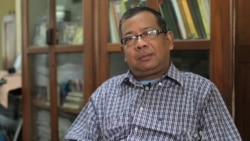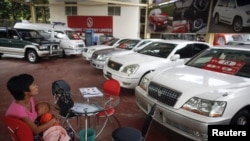RANGOON —
Burma's roads were once a strange showcase for extremely expensive, decades-old cars kept running through home-grown ingenuity. But in recent years economic reforms have drastically changed the car market.
Taxi driver U Win Naing just paid a little more than $6,000 for this Japanese import. It might seem like a lot for a 1988 Nissan Sunny, but he feels like he got a great deal.
“We’re in a period when the car prices are dropping so I’m happy," he said. "The government is now doing a good job. As the country progresses, these older cars should not be on the road any longer."
Just six years ago, a 20-year-old Japanese car would have cost around $100,000. Junkyard-ready vehicles were kept on the roads because the government restricted imports, making those already in the country extremely valuable.
Cars and other luxury items were once available only to corrupt military officials, said Ko Soe Moe, one of about 2,000 freelance car brokers in Rangoon who may soon be out of a job.
“The combined cost of the permission ticket and the value of the new car was around $400,000, so only the highest class of the country could afford," Moe said. Generals and their inner circles only could do it.There is no such thing as a car lot like these or a car dealer broker like me in other countries. Business like this is only going on where there are no real showrooms.”
Deregulating the market has instead opened up business opportunities for people like Nyi Nyi, who makes a living doing custom upgrades of Burma’s new car enthusiasts.
“Yea, there’s a group of people who are very much into cars, a lot of car enthusiasts, and that community is growing as days go by," he said. “Before it was totally different. Burma is only one of the very few countries when you buy a car the price can appreciate, the value will appreciate and you actually invest in it, you can get a profit from buying a car and selling it back.
Rangoon-based economist Khin Maung Nyo said with car prices falling because of looser import controls, Burmese are no longer buying them as long-term investments.
“The car market is part of the property market, or part of the asset market, now speculation moved from car market to real estate," said Nyo.
In gridlocked Rangoon, it's a sign that reform is on the road in Burma.
Taxi driver U Win Naing just paid a little more than $6,000 for this Japanese import. It might seem like a lot for a 1988 Nissan Sunny, but he feels like he got a great deal.
“We’re in a period when the car prices are dropping so I’m happy," he said. "The government is now doing a good job. As the country progresses, these older cars should not be on the road any longer."
Just six years ago, a 20-year-old Japanese car would have cost around $100,000. Junkyard-ready vehicles were kept on the roads because the government restricted imports, making those already in the country extremely valuable.
Cars and other luxury items were once available only to corrupt military officials, said Ko Soe Moe, one of about 2,000 freelance car brokers in Rangoon who may soon be out of a job.
“The combined cost of the permission ticket and the value of the new car was around $400,000, so only the highest class of the country could afford," Moe said. Generals and their inner circles only could do it.There is no such thing as a car lot like these or a car dealer broker like me in other countries. Business like this is only going on where there are no real showrooms.”
Deregulating the market has instead opened up business opportunities for people like Nyi Nyi, who makes a living doing custom upgrades of Burma’s new car enthusiasts.
“Yea, there’s a group of people who are very much into cars, a lot of car enthusiasts, and that community is growing as days go by," he said. “Before it was totally different. Burma is only one of the very few countries when you buy a car the price can appreciate, the value will appreciate and you actually invest in it, you can get a profit from buying a car and selling it back.
Rangoon-based economist Khin Maung Nyo said with car prices falling because of looser import controls, Burmese are no longer buying them as long-term investments.
“The car market is part of the property market, or part of the asset market, now speculation moved from car market to real estate," said Nyo.
In gridlocked Rangoon, it's a sign that reform is on the road in Burma.














